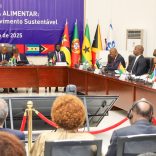Mozambique: Chapo calls on CPLP to work for food sovereignty
Mozambique Elections: Macie proposes 9-year non-renewable terms of office for CC judges

File photo: Presidente Filipe Nyusi / Facebook
Judge counsellor to the Constitutional Council (CC) of Mozambique, Albano Macie, on Monday proposed the extension of the terms of office of CC magistrates from five to nine years, non-renewable, to eliminate doubts about the independence of the entity.
“If it is true that the expectation of renewing terms of office puts the independence of counsellor judges at risk, then we understand that we should move to a system in which they can have longer terms of office, without the possibility of renewal,” said Macie.
There are countries that already follow the model of lengthier, non-renewable terms for magistrates, he added.
READ: Mozambican president dismisses deputy minister of state administration
The Constitution of the Republic of Mozambique requires that CC advisory judges have five-year terms of office, renewable for the same period.
The president of the CC is appointed by the President of the Republic, and the remaining advisory judges by the Assembly of the Republic, in accordance with the principle of proportionality. One is nominated by the Superior Council of the Judiciary (CSMJ).
The CC is under great pressure in Mozambique, which waits for the body to validate and proclaim the results of the October 11 municipal elections.
The opposition has held demonstrations against the results announced by the National Elections Commission (CNE), which give victory to the Front for the Liberation of Mozambique (Frelimo), the party in power, in 64 of the 65 municipalities, with the exception of the city of Beira, which went to the MDM.
The Mozambican National Resistance (Renamo), the main opposition party, which in the previous 53 municipalities (12 new municipalities were created this year) led in eight, was left without any municipalities, despite claiming victory in the country’s largest cities, based on the minutes and original notices from polling stations, having appealed to the CC, the last instance of appeal in the electoral process.
Some district courts recognized irregularities in the electoral process and ordered the repetition of several electoral acts, while street demonstrations contesting the announced results are regularly held, which have yet to be confirmed by the CC.
- Albano Macie served as Deputy Minister of State Administration and Civil Service from 2018 to 2019, replacing Roque Silva in the post. He was dismissed after he was elected Judge Counsellor of the Constitutional Council by parliament in 2019. Albano Macie is also a Judge at the Southern African Development Community Administrative Tribunal (SADCAT) in November, 2022. Previously, Macie had worked as an advisor to the President of the Assembly of the Republic, Verónica Macamo. He was part of the team appointed by the Head of State in 2016 to discuss the decentralisation package submitted to the Assembly of the Republic. Macie, 45 years of age, obtained a PhD in Law and Security from the Faculty of Law of Universidade Nova de Lisboa, Portugal, in December, 2020. He holds a Master’s degree in Legal Sciences from Eduardo Mondlane University, in cooperation with the University of Lisbon.












Leave a Reply
Be the First to Comment!
You must be logged in to post a comment.
You must be logged in to post a comment.